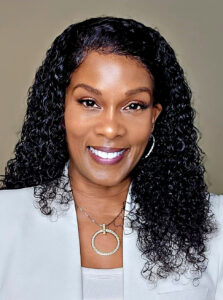
Supported by nearly 25 years of professional experience, Karen M. Soares, awarded the Doctor of Humane Letters honorary degree for her extensive humanitarian accomplishments, is highly distinguished in the information technology and clean energy sectors. Years ago, she witnessed her father-in-law tell the story of a tragedy that occurred in the Cape Verde Islands due to a lack of clean, safe drinking water. From that point forward, Ms. Soares felt motivated to make a difference. In 2008, she boarded a flight to the Canary Islands as part of a business mission trip, where she noticed a magazine article regarding water desalination plants that were powered by wind turbines. Instilling in her a sense of purpose, the article captured her heart and solidified her belief that she was meant to help underdeveloped populations access clean energy solutions. Since that time, Ms. Soares has dedicated her career to assisting communities with a great need for cleaner energy.
Since 2022, Ms. Soares has been the program director of the Clean Energy Initiative for the HBCU Community Development Action Coalition, which was founded in 2010 by its chief executive officer, Ron Butler, who saw the need to form a task force focused on aiding historically Black colleges and universities and other minority-serving institutions. Its Clean Energy Initiative was launched in 2017 and has since been met with praise and applause. Notably, Ms. Soares oversees clean energy solutions for the 107 historically Black colleges and universities in the United States, as well as participates in the HBCU Community Development Action Coalition’s small business development programs. In this regard, many of the organization’s programs foster economic empowerment, bringing tangible benefits to the communities it serves. Among its many projects, the organization is demonstrating its expertise with a $35 million project in Orangeburg, South Carolina, servicing South Carolina State University and Claflin University. To this end, they are ensuring that the footprint is under the HBCU “Green Town” model.
Adjacent to her primary endeavors, Ms. Soares has served as the president and chief executive officer of Go Eagle Energy Solutions, LLC, since 2010. Earlier in her career, she was the chairperson of the board of trustees of Barber-Scotia College from 2016 to 2022 and the chief information officer of JMI Telecom Corporation from 2007 to 2010. She commenced her career in 2000, serving as the president of Get-U-Started w/NT Solutions until 2016. Notably, Get-U-Started was established to help businesses, the federal government, and communities integrate with new technological solutions. Additionally, Barber-Scotia College is recognized as the first historically Black college established after the Civil War to educate young Black women in the United States, as well as the only historically Black college out of 107 HBCUs to offer a degree in renewable energy. Seeing the opportunity as God aligning her own desire with God’s purpose, Ms. Soares dedicated more than 12 years to helping the college prior to accepting her current position.
Among the many highlights of her career, Ms. Soares is particularly gratified by the opportunity to help others grow into the best versions of themselves. To this end, she has always enjoyed surrounding herself with intelligent individuals from whom she can gain additional knowledge to share with her own circles. Moreover, she has always felt intrinsically motivated by the concept of sisterhood, particularly in the realm of technology, where professional women are often pioneers in their specialties. Instead of feeling separated from her peers, Ms. Soares applauds their tenacity and achievements.
Ms. Soares is presently writing a book titled “100 Women in Energy,” which will profile and detail the achievements and opportunities of women in the energy and technology industries. As such, she believes there are ample opportunities for women to succeed in the modern era, and society must collectively build upon those opportunities so future generations of women can grow in the realm of energy, which has typically been a male-dominated field. Furthermore, she is proud of the technology she and her small business built that was later utilized by the U.S. Department of Justice for $3.3 million to automate its asset forfeiture department.
In the coming years, Ms. Soares aims to bring solar cookers to Africa to modernize communities in the area as well as create healthier practices for African women. She would also like to travel more often and educate others in various countries.
